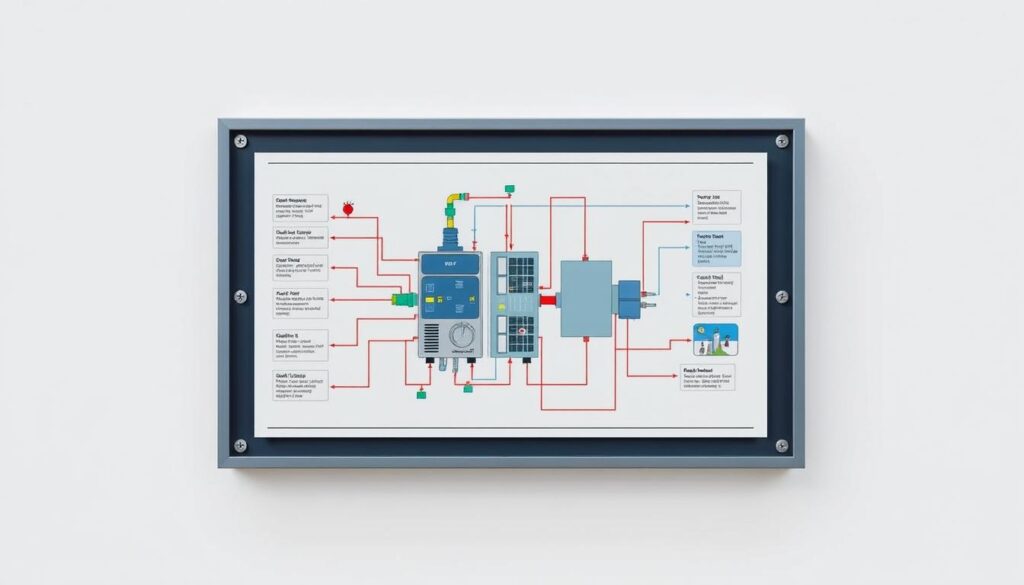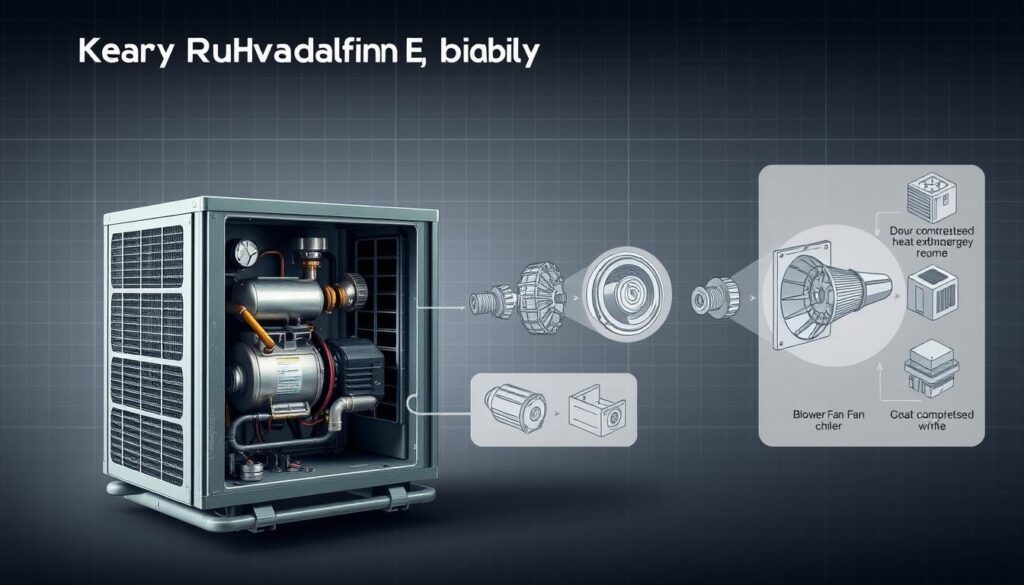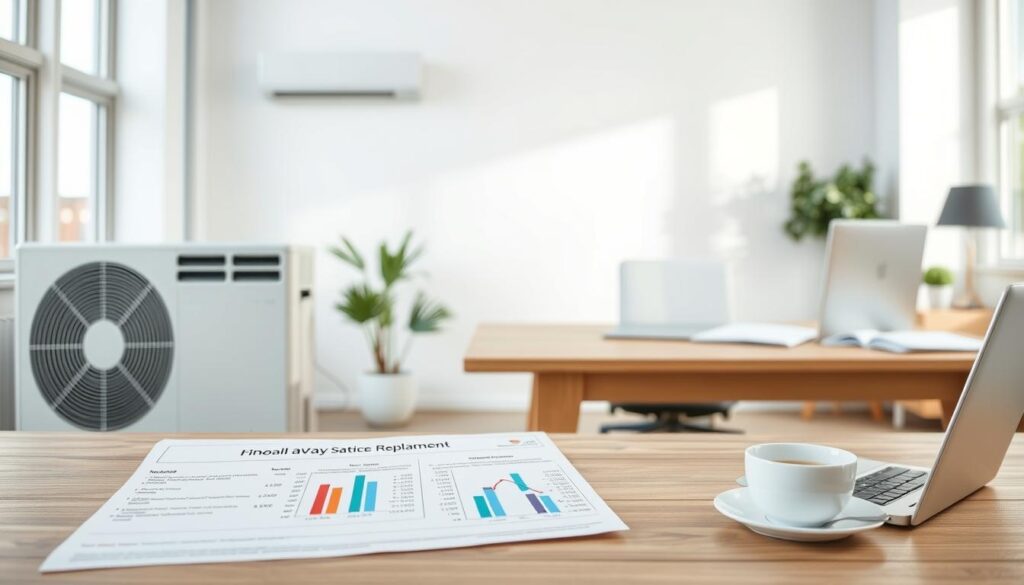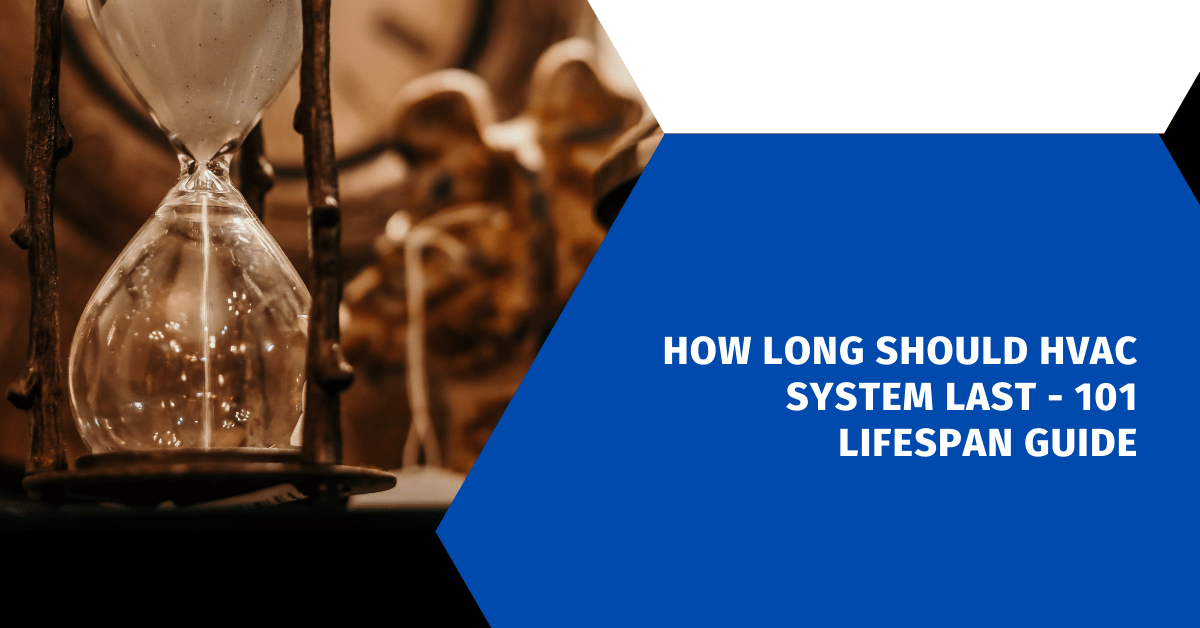Affiliate Disclosure
HVAC Guide Guys is a participant in the Amazon Services LLC Associates Program, an affiliate advertising program designed to provide a means for sites to earn advertising fees by advertising and linking to Amazon.
How Long Should HVAC System Last? Ever wondered how long your home’s comfort system will last? Knowing its lifespan can save you thousands and keep your home comfy.

Your HVAC system is vital for your home’s comfort. It usually lasts 15 to 20 years. But, many things can affect how long it works well.
Understanding your HVAC’s lifespan is more than just knowing its age. It’s about keeping it in top shape and watching for signs of wear. By being proactive, you can make your system last longer and work better.
Key Takeaways
- Average HVAC system lifespan is 15-20 years
- Regular maintenance can significantly extend system performance
- Performance indicators help predict possible system failure
- Climate and usage patterns impact overall system durability
- Professional inspections are key for long-term efficiency
Table of Contents
Understanding HVAC Systems and Their Components
Your home’s comfort relies on a complex network of heating, ventilation, and air conditioning (HVAC) systems. These machines are key for keeping your indoor temperature and air quality right. Knowing how to extend your HVAC system’s life can help you make smart choices about upkeep and when to replace it.
HVAC systems vary, each with its own strengths and weaknesses. How long your system lasts depends on several things. These include the type of system, how well it’s maintained, and the environment it’s in.
Different Types of HVAC Systems
Today’s homes use many HVAC system types. Each is made for different heating and cooling needs:
- Central air conditioning systems
- Heat pumps
- Ductless mini-split systems
- Furnaces
- Boilers
Key Components and Their Functions
The durability of your HVAC system depends on its parts. Important components include:
- Compressor: Moves refrigerant and cools
- Condenser coil: Gets rid of heat from the refrigerant
- Evaporator coil: Takes in indoor heat
- Blower motor: Moves air through the system
Common HVAC Configurations
Your home might have a split system, a packaged unit, or a hybrid setup. Each design affects how efficient your system is and how long it might last. Getting regular checks from pros can spot problems early and keep your system running well.
Proper maintenance can extend your HVAC system’s life by up to 40%, reducing long-term replacement costs.
Explore Our HVAC Shop
Looking for top-rated HVAC tools, parts, and accessories? Visit our shop and find the perfect solution for your needs.
Visit the ShopAverage Lifespan of Various HVAC Systems
Knowing how long different HVAC systems last helps you plan for replacements and budget. Each system’s lifespan changes based on maintenance, use, and the environment.
The time you’ll need to replace your HVAC depends on what you have. Here’s a look at the average lifespans for common systems:
- Central Air Conditioning Units: 12-17 years
- With great care, some can last up to 20 years
- Regular checks can make them last longer
- Heat Pumps: 10-16 years
- Ground-source heat pumps often last longer than air-source ones
- Keeping them well-maintained can extend their life to 16 years
- Furnaces and Boilers: 15-20 years
- Electric furnaces might last 40-50 years
- Getting them checked yearly is key to their long life
- Geothermal Heat Pumps: 25-30 years
- They are the most durable HVAC option
- They cost more upfront but last longer
“Investing in regular maintenance can significantly extend your HVAC system’s life and performance.”
Your HVAC’s lifespan can change based on how you use it, how often you maintain it, and your local climate. Getting it serviced yearly can help it work better and last longer.
Explore Our HVAC Shop
Looking for top-rated HVAC tools, parts, and accessories? Visit our shop and find the perfect solution for your needs.
Visit the ShopHow Long Should HVAC System Last: A Complete Guide
Knowing how long an HVAC system lasts is key for homeowners. It helps with planning comfort and budget over time. The lifespan of HVAC parts varies based on upkeep, use, and the environment.
The lifespan of your HVAC system depends on several things. Let’s look at the expected lifespans of different heating and cooling systems:
Furnaces and Boilers: The Long-Lasting Workhorses
Furnaces and boilers are known for their long life. Gas furnaces can last 20-30 years with good care. Oil furnaces, on the other hand, have a shorter life of 10-15 years.
| Furnace/Boiler Type | Average Lifespan | Maintenance Impact |
|---|---|---|
| Gas Furnaces | 20-30 years | High with regular service |
| Oil Furnaces | 10-15 years | Moderate maintenance needed |
| Steam Boilers | 15-35 years | Depends on water quality |
Air Conditioning Units: Cooling with a Finite Lifespan
Air conditioning units usually last 10-15 years. Coastal areas can shorten this to 7-12 years because of salt and corrosion.
Heat Pumps and Split Systems: Versatile and Durable
Heat pumps can last 15-20 years. Ductless mini-split systems can last 10-30 years with great care.
- Regular maintenance extends system life
- Environmental factors impact durability
- Modern systems offer improved longevity
Professional maintenance can add years to your HVAC system’s life, potentially saving thousands in replacement costs.
Factors Affecting HVAC System Longevity

Knowing what affects your HVAC system’s life is key. Its lifespan depends on several important factors. These can greatly impact how well it works and how long it lasts.
Several key factors determine how long your HVAC system will last:
- Installation Quality: Proper installation prevents premature wear and reduces system stress
- Maintenance Frequency: Regular professional tune-ups can extend system life by 5-10 years
- Usage Patterns: Consistent, moderate use helps maintain system efficiency
- Environmental Conditions: Extreme temperatures and high humidity accelerate system aging
Your local climate greatly affects your HVAC system’s durability. Places with extreme temperatures make systems work harder. This can shorten their lifespan from 10-25 years to 15-18 years without care.
Regular maintenance is the best way to keep your HVAC system running long. Annual checks, monthly filter changes, and fixing small issues early can save you money. It also prevents the need for expensive repairs or early replacements.
Regular maintenance isn’t an expense—it’s an investment in your home’s comfort and efficiency.
By understanding these factors and taking good care of your system, you can make it last longer. This ensures it works well and avoids sudden breakdowns.
Explore Our HVAC Shop
Looking for top-rated HVAC tools, parts, and accessories? Visit our shop and find the perfect solution for your needs.
Visit the ShopSigns Your HVAC System Needs Replacement
Spotting the signs of an aging HVAC system can prevent sudden breakdowns and expensive fixes. A working heating and cooling system is key to your home’s comfort. Knowing when to replace it is vital for keeping your system running smoothly.
Physical Warning Signs
Your HVAC system might be showing you it’s time for a new one. Look out for these physical signs:
- Visible rust or corrosion on the unit
- Cracks or damage to external components
- Excessive moisture or leaks around the system
- Persistent dust buildup near vents
Performance Indicators
Performance problems are clear signs your HVAC system is aging. Watch for these symptoms:
- Inconsistent temperatures throughout your home
- Unusual noises like grinding, squealing, or banging
- Weak airflow from vents
- Frequent cycling on and off
Cost-Related Factors
The need for a new HVAC system often becomes clear when repair costs add up. Keep an eye on these financial signs:
| Cost Factor | Replacement Threshold |
|---|---|
| Repair Frequency | More than two major repairs per year |
| Repair Cost | Repairs exceeding 50% of new system cost |
| Energy Bills | 30% increase in monthly utility expenses |
Pro tip: If your HVAC system is over 10 years old and has many problems, getting a new one might be cheaper than fixing it over and over.
Essential Maintenance Tips to Extend HVAC Lifespan
Keeping your HVAC system running well needs regular and smart maintenance. Taking good care of it can make it last longer and work better. This can save you a lot of money on new systems.
Regular upkeep is key to making your HVAC system last longer. Being proactive can stop sudden failures and keep your system running smoothly.
- Replace air filters every 1-3 months to maintain optimal airflow
- Schedule annual professional inspections before peak seasons
- Clean outdoor units and maintain two-foot clearance around them
- Use programmable thermostats to reduce system strain
- Clean condensate drain lines every few months
How you maintain your HVAC system can really make a difference. Getting professional tune-ups can catch problems early. This stops small issues from becoming big, costly repairs.
Important maintenance steps include:
- Regular filter cleaning/replacement
- Comprehensive system inspections
- Ductwork cleaning every 3-5 years
- Checking refrigerant levels
- Monitoring energy consumption
By regularly maintaining your HVAC system, you can make it last for decades. This ensures your home stays comfortable and uses energy efficiently.
Impact of Climate and Usage Patterns on System Duration
Your HVAC system’s life span is not just about upkeep. Climate and how you use it also matter a lot. These factors greatly affect how long your HVAC system lasts.
Different places pose different challenges for HVAC systems. Severe weather can make systems wear out faster and work less well.
Regional Weather Considerations
The weather where you live has a big impact on your HVAC system’s life. Areas with tough weather can make systems last less long:
- Coastal Areas: Salty air causes faster corrosion, reducing lifespan to 7-12 years
- Extreme Cold Regions: Prolonged heating cycles stress system components
- High Heat & Humidity Zones: Increased strain leads to 10-12 year lifespans
- Mild Climates: Most favorable, supporting 15-25 year system duration
Seasonal Stress Factors
How you use your HVAC system also affects its life span. Keep these points in mind:
- Constant Usage: Reduces lifespan to 10-15 years
- Seasonal Usage: Supports 15-20 year system life
- Minimal Use: Potentially extends system life to 20-25 years
“Understanding your local climate and usage habits is key to maximizing HVAC system performance and longevity.” – HVAC Industry Expert
Pro Tip: Regular maintenance can help mitigate climate-related system stress and extend your HVAC’s operational life.
Explore Our HVAC Shop
Looking for top-rated HVAC tools, parts, and accessories? Visit our shop and find the perfect solution for your needs.
Visit the ShopCost Considerations: Repair vs. Replace

Choosing between fixing or replacing your HVAC system is tough. The decision depends on several key financial factors. Homeowners need to weigh these carefully.
Experts suggest a careful plan to decide between repair or replacement. The “5,000 rule” is a useful guide. It says to multiply your system’s age by the repair cost. If it’s over $5,000, it’s likely cheaper to replace it.
- Repair if system is less than 15 years old
- Consider replacement if repairs occur three or more times in three years
- Evaluate energy efficiency of a new system
The age of your HVAC system is very important. A well-kept system can last up to 20 years. But, its efficiency drops after 15 years.
| System Age | Remaining Value | Recommended Action |
|---|---|---|
| 9-10 years | $3,500 – $3,112 | Repair preferred |
| 13-15 years | $1,984 – $1,172 | Consider replacement |
| 18+ years | $0 | Replacement recommended |
“Investing in a new HVAC system can reduce energy costs by over 35% with modern, high-efficiency models.” – Energy Efficiency Experts
Getting a new HVAC system can save you money. The Inflation Reduction Act offers tax credits up to 30% of the cost. This could save you thousands.
Energy Efficiency and Modern HVAC Technologies
Modern HVAC technologies are changing how we enjoy our homes. Upgrading to newer systems can make your home more comfortable and energy-efficient. These systems have SEER ratings of 14-20, saving a lot of energy compared to older models.
Keeping your HVAC system in good shape is more important than ever. Electric air-source heat pumps use up to a third less energy than old systems. This means big savings for homeowners. The U.S. Department of Energy says heating and cooling use almost half of home energy, making these new technologies very valuable.
Utility companies and the government offer great deals for energy-efficient upgrades. Many modern HVAC systems qualify for tax credits and rebates. This makes upgrading more affordable. By choosing the latest systems, you could save 20-40% on energy, cut utility bills by over $100 a year, and make your HVAC last longer.
The future of HVAC is all about electric appliances. These systems work better, save money in the long run, and are better for the environment. When you think about upgrading, remember the benefits of energy savings, better comfort, and a longer-lasting system.

